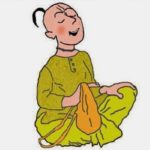
What is true dharma in this Kali Yuga?
Chanting & distributing Lord's Holy Names.
The cycle of Satya is characterized by virtue, wisdom and religion, there being practically no ignorance and vice, and the yoga lasts 1,728,000 years. Satya Yuga people meditated on Lotus feet of Supreme Lord. It was possible because their mind was not agitated. They were pure. They lived for 1 lakh years.
In the Tretā-yuga vice is introduced, and this yuga lasts 1,296,000 years. Tretā-yuga people performed yazna – ghee, mantras and all items to be offered were pure and was available. Priests were also pure. They lived for 10,000 years.
In the Dvāpara-yuga there is an even greater decline in virtue and religion, vice increasing, and this yuga lasts 864,000 years. Dvāpara-yuga people performed deity worship – wealth and prosperity were there. Cleanliness were maintained. So, it was possible. They lived for 1,000 years.
And finally in Kali-yuga (the yuga we have now been experiencing over the past 5,000 years) there is an abundance of strife, ignorance, irreligion and vice, true virtue being practically nonexistent, and this yuga lasts 432,000 years. In Kali-yuga mind was so agitated – not pure – no pure ghee – not even pure water available. No wealth and prosperity – no cleanliness.
People in general, especially in this Age of Kali, are enamored by the external energy of Krishna, and they wrongly think that by advancement of material comforts every man will be happy. This age of Kali is the most condemned age due to its quarrelsome features, most of the population is foolish and not adequately educated to understand Vedānta philosophy.
It is not possible for an ordinary man to leave home and go to a secluded place in the mountains or jungles to practice yoga in this Age of Kali. The present age is characterized by a bitter struggle for a life of short duration. People are not serious about self-realization even by simple, practical means, and what to speak of this difficult yoga system, which regulates the mode of living, the manner of sitting, selection of place, and detachment of the mind from material engagements.
As a practical man, Arjuna thought it was impossible to follow this system of Ashtanga yoga, even though he was favorably endowed in many ways. He belonged to the royal family and was highly elevated in terms of numerous qualities, he was a great warrior, he had great longevity, and, above all, he was the most intimate friend of Lord Krishna, the Supreme Personality of Godhead. Five thousand years ago, Arjuna had much better facilities than we do now, yet he refused to accept this system of yoga. Therefore this system must be considered generally impossible in this Age of Kali.
In the Age of Kali, the saṅkīrtana-yajña (the chanting of the names of God) is recommended by the Vedic scriptures, Unless one practices celibacy, advancement in spiritual life is very difficult. Therefore Lord Chaitanya has announced, according to the scriptural injunctions for this Age of Kali, that in this age no process of realizing the Supreme is possible except the chanting of the holy names of Lord Kṛṣṇa: Hare Krishna, Hare Krishna, Krishna Krishna, Hare Hare/ Hare Rāma, Hare Rāma, Rāma Rāma, Hare Hare. Chanting The Hare Krishna Maha-mantra is the Yuga-Dharma for Kali-yuga.
The Hare Krishna maha-mantra is mentioned in various scriptures as the only means of deliverance in this age of Kali:

